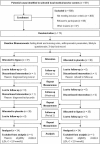Effects of a flaxseed-derived lignan supplement in type 2 diabetic patients: a randomized, double-blind, cross-over trial - PubMed (original) (raw)
Randomized Controlled Trial
. 2007 Nov 7;2(11):e1148.
doi: 10.1371/journal.pone.0001148.
Jianqin Sun, Yanqiu Chen, Xingwang Ye, Huaixing Li, Zhijie Yu, Yanfang Wang, Wenjia Gu, Xinyi Zhang, Xiafei Chen, Wendy Demark-Wahnefried, Yong Liu, Xu Lin
Affiliations
- PMID: 17987126
- PMCID: PMC2048577
- DOI: 10.1371/journal.pone.0001148
Randomized Controlled Trial
Effects of a flaxseed-derived lignan supplement in type 2 diabetic patients: a randomized, double-blind, cross-over trial
An Pan et al. PLoS One. 2007.
Abstract
Background: Flaxseed consumption has been shown to improve blood lipids in humans and flaxseed-derived lignan has been shown to enhance glycemic control in animals. The study aimed to investigate the effect of a flaxseed-derived lignan supplement on glycemic control, lipid profiles and insulin sensitivity in type 2 diabetic patients.
Methodology/principal findings: This was a randomized, double-blind, placebo-controlled, cross-over trial and it was conducted between April and December 2006 in Shanghai, China. Seventy-three type 2 diabetic patients with mild hypercholesterolemia were enrolled into the study. Patients were randomized to supplementation with flaxseed-derived lignan capsules (360 mg lignan per day) or placebo for 12 weeks, separated by an 8-week wash-out period. HbA1c, lipid profiles, insulin resistance index and inflammatory factors were measured. Sixty-eight completed the study and were included in the analyses. The lignan supplement significantly improved glycemic control as measured by HbA(1c) (-0.10+/-0.65 % vs. 0.09+/-0.52 %, P = 0.001) compared to placebo; however, no significant changes were observed in fasting glucose and insulin concentrations, insulin resistance and blood lipid profiles. Urinary excretion of lignan metabolites (enterodiol and enterolactone) was significantly higher after the lignan supplement intervention compared to baseline (14.2+/-18.1 vs. 1.2+/-2.4 microg/mL, P<0.001). Data also suggested minimal competition between lignan and isoflavones for bioavailability when measured by the excretion concentrations.
Conclusions/significance: Daily lignan supplementation resulted in modest, yet statistically significant improvements in glycemic control in type 2 diabetic patients without apparently affecting fasting glucose, lipid profiles and insulin sensitivity. Further studies are needed to validate these findings and explore the efficacy of lignans on type 2 diabetes.
Trial registration: ClinicalTrials.gov NCT00363233.
Conflict of interest statement
Competing Interests: The authors have declared that no competing interests exist.
Figures
Figure 1
Study flow chart of the lignan intervention trial.
Similar articles
- Effects of a flaxseed-derived lignan supplement on C-reactive protein, IL-6 and retinol-binding protein 4 in type 2 diabetic patients.
Pan A, Demark-Wahnefried W, Ye X, Yu Z, Li H, Qi Q, Sun J, Chen Y, Chen X, Liu Y, Lin X. Pan A, et al. Br J Nutr. 2009 Apr;101(8):1145-9. doi: 10.1017/S0007114508061527. Br J Nutr. 2009. PMID: 18775100 Clinical Trial. - Influence of Flaxseed Lignan Supplementation to Older Adults on Biochemical and Functional Outcome Measures of Inflammation.
Di Y, Jones J, Mansell K, Whiting S, Fowler S, Thorpe L, Billinsky J, Viveky N, Cheng PC, Almousa A, Hadjistavropoulos T, Alcorn J. Di Y, et al. J Am Coll Nutr. 2017 Nov-Dec;36(8):646-653. doi: 10.1080/07315724.2017.1342213. Epub 2017 Sep 18. J Am Coll Nutr. 2017. PMID: 28922068 Clinical Trial. - Daily consumption for six weeks of a lignan complex isolated from flaxseed does not affect endothelial function in healthy postmenopausal women.
Hallund J, Tetens I, Bügel S, Tholstrup T, Ferrari M, Teerlink T, Kjaer A, Wiinberg N. Hallund J, et al. J Nutr. 2006 Sep;136(9):2314-8. doi: 10.1093/jn/136.9.2314. J Nutr. 2006. PMID: 16920847 Clinical Trial. - Flaxseed and Diabetes.
Prasad K, Dhar A. Prasad K, et al. Curr Pharm Des. 2016;22(2):141-4. doi: 10.2174/1381612822666151112151230. Curr Pharm Des. 2016. PMID: 26561065 Review. - Flaxseed and cardiovascular health.
Prasad K. Prasad K. J Cardiovasc Pharmacol. 2009 Nov;54(5):369-77. doi: 10.1097/FJC.0b013e3181af04e5. J Cardiovasc Pharmacol. 2009. PMID: 19568181 Review.
Cited by
- A randomized trial of the effects of flaxseed to manage constipation, weight, glycemia, and lipids in constipated patients with type 2 diabetes.
Soltanian N, Janghorbani M. Soltanian N, et al. Nutr Metab (Lond). 2018 May 9;15:36. doi: 10.1186/s12986-018-0273-z. eCollection 2018. Nutr Metab (Lond). 2018. PMID: 29760761 Free PMC article. - Evaluation of protective efficacy of flaxseed lignan-Secoisolariciresinol diglucoside against mercuric chloride-induced nephrotoxicity in rats.
Aqeel T, Chikkalakshmipura Gurumallu S, Hashimi SM, AlQurashi N, Javaraiah R. Aqeel T, et al. Mol Biol Rep. 2019 Dec;46(6):6171-6179. doi: 10.1007/s11033-019-05052-7. Epub 2019 Sep 6. Mol Biol Rep. 2019. PMID: 31493285 - Effect of flaxseed oil supplementation on anthropometric and metabolic indices in patients with coronary artery disease: A double-blinded randomized controlled trial.
Saleh-Ghadimi S, Kheirouri S, Golmohammadi A, Moludi J, Jafari-Vayghan H, Alizadeh M. Saleh-Ghadimi S, et al. J Cardiovasc Thorac Res. 2019;11(2):152-160. doi: 10.15171/jcvtr.2019.26. Epub 2019 Jun 30. J Cardiovasc Thorac Res. 2019. PMID: 31384411 Free PMC article. - Dietary Flaxseed as a Strategy for Improving Human Health.
Parikh M, Maddaford TG, Austria JA, Aliani M, Netticadan T, Pierce GN. Parikh M, et al. Nutrients. 2019 May 25;11(5):1171. doi: 10.3390/nu11051171. Nutrients. 2019. PMID: 31130604 Free PMC article. Review. - Physiological and Pathological Considerations for the Use of Flaxseed as a Therapeutic Dietary Strategy.
Hirst BC, Dibrov E, Hirst SD, Pierce GN. Hirst BC, et al. Rev Cardiovasc Med. 2023 May 18;24(5):149. doi: 10.31083/j.rcm2405149. eCollection 2023 May. Rev Cardiovasc Med. 2023. PMID: 39076734 Free PMC article. Review.
References
- King H, Aubert RE, Herman WH. Global burden of diabetes, 1995–2025: prevalence, numerical estimates, and projections. Diabetes Care. 1998;21:1414–1431. - PubMed
- Kaur J, Singh P, Sowers JR. Diabetes and cardiovascular diseases. Am J Ther. 2002;9:510–515. - PubMed
- Haffner SM. Management of dyslipidemia in adults with diabetes. Diabetes Care. 1998;21:160–178. - PubMed
- Duncan AM, Phipps WR, Kurzer MS. Phyto-oestrogens. Best Pract Res Clin Endocrinol Metab. 2003;17:253–271. - PubMed
- Bhathena SJ, Velasquez MT. Beneficial role of dietary phytoestrogens in obesity and diabetes. Am J Clin Nutr. 2002;76:1191–1201. - PubMed
Publication types
MeSH terms
Substances
LinkOut - more resources
Full Text Sources
Medical
Miscellaneous
